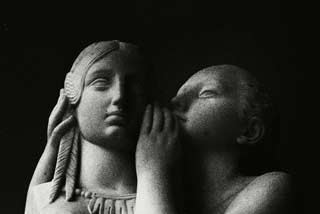
Martin Goodson
Studying the Hidden Essence
Exercises in Mindfulness
In Zen practice, being able to respond in accordance with the circumstances we find ourselves in, is a highly prized skill. By learning to do this effectively, we come to understand our own hidden essence.
 ©
©
Master Rinzai said, ‘When you meet a swordsman, show him your sword. Do not show your poem to a man who is not a poet.’
We may not quite know what to make of such sayings. So we look further.
In the Nirvana Sutra, we read about the Four Necessities or Four Essentials - of water, salt, vessel, and horse — water for washing and drinking, etc., salt for food to be tasty, a vessel or cup as container, and a horse for progress. The collective term for these four, in Sanskrit, is Saindhava which may mean any of these four according to the situation.
The Nirvana Sutra elucidates this by the story of the wise minister who ‘understood well these four meanings.’
When the king, wanting to wash, asked for Saindhava, the minister brought him water. At table, when the king asked for Saindhava, the minister handed him salt, and when asking for Saindhava after the meal, the minister served him a hot drink in a cup. About to set out on a journey the king asked for Saindhava, so the minister brought a horse. This wise minister unfailingly acted according to the king’s intention/need.’
And just so, says Master Hyakujo, referring to the above quotation, ‘the wise study the hidden essence and are skilfully able to communicate and to respond to the situation faultlessly.’
If this seems unrelated to our daily life, just stop and look!
Do we ever really listen to what people tell us? Even less are we aware of what they say ‘behind’ the words. Being too busy with ourselves, do we easily take in what somebody says, means, or needs? We only indulge in opinions about what is good for you and what you should do; these ‘I’ then want to press on to you, but you yourself ‘I’ do not take into account, and so you remain ever unknown to ‘me’.
Yet, the body flashes all the relevant signals — physically, in movements, in the tone of voice, reflected in our eyes, etc. Only I am usually so engrossed in myself that I am not aware of what you thus ‘flash’ across or communicate — nor what I myself unwittingly ‘reveal’.
On careful inspection, yes, we are so closed in on ourselves that your needs cannot penetrate that wall and so remain unperceived. And we are also crammed full with our own notions and opinions so do not hear more than the first few words you say — rather assume the rest. Small wonder that there is so much concern about lack of relationship and lack of communication.
Our training, the Daily Life Practice, helps to rectify this, to ‘open us up’ in the sense of creating a vent through which these notions may escape, evaporate as it were, for they are nothing but thin air anyway. This ‘opening up’ empties the self-centred, closed-in cocoon of ‘me’, of ‘my’ stubborn notions and emotionality, and awakens to what we really are — ‘Not- I’ — at which the heart opens wide and is once more reunited in awareness with the unity of Being.
Thus the goodwill, of which we are reminded at Christmas time and which our world so sorely needs. In this spirit, A Merry Christmas and Happy New Year to you and your families and friends.
Light the lamp of goodwill which can light a thousand lamps without diminishing itself.




